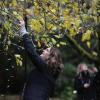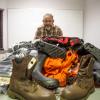May 22, 2009 - 2:03am
Vancouver Island University’s (VIU) Deep Bay Field Station site was the setting for a formal ground-breaking ceremony on May 21, 2009. The event marked the beginning of construction of a critical piece of rural infrastructure to support the continued growth and diversification of the BC shellfish aquaculture industry.
“We promised the federal and provincial governments that this project was “shovel-ready” and I am pleased to say that just six weeks after we received the final funding commitments, we have broken ground and can begin construction,” said Don Tillapaugh, Director of VIU’s Centre for Shellfish Research. “Construction will take 14 months and employ 60 people. We intend to be operational by July 2010.”
“This new field station will support the growth of the shellfish industry and spur on the creation of new jobs on Vancouver Island and the Sunshine Coast, benefiting communities and First Nations,” said Ralph Nilson, VIU President and Vice-Chancellor.
This project represents a collaborative funding partnership supported federally by Industry Canada and the Canada Foundation for Innovation (CFI) and provincially by the Ministry of Advanced Education and the Island Coastal Economic Trust.
“We are grateful that these agencies recognize the important role education and research is playing in shaping the shellfish industry,” Nilson said.
James Lunney, MP for Nanaimo-Alberni, was delighted to see the rapid progress.
“In addition to the immediate stimulus benefits, the Deep Bay Field Station will make huge contributions in knowledge generation and innovation for the benefit of the shellfish industry,” said Lunney. “The growth in jobs in BC coastal and First Nations communities through sustainable shellfish aquaculture will be one of the positive legacies of federal investments in this project.”
The BC Minister of Agriculture, Ron Cantelon, was also on-hand to celebrate the event.
“Deep Bay is a landmark for BC – it’s the first aquaculture field station in the province,” said Cantelon. “We have seen the historic value of field stations in supporting the development of the agriculture industry in this province and this station will provide similar benefits for shellfish aquaculture.”
“The Deep Bay Field Station is a powerful example of what can be achieved when various stakeholders come together as partners,” said Dr. Eliot Phillipson, President and CEO of the CFI. “Upon completion, this facility will further enhance Canada’s capacity to effectively compete in the global research arena.”
“The Deep Bay Field Station fits with our mandate to invest in agriculture and aquaculture,” said Joe Stanhope, Chair of the Island Coastal Economic Trust. “Aquaculture has the potential of becoming a $100 million industry in the future, and we believe that industry is vital to the future of our coastal communities.”
The Deep Bay Field Station will cluster scientific, environmental, economic and public engagement programming into one 900 sq. m. facility, creating a centre of excellence and innovation to support sustainable shellfish aquaculture development and preservation of coastal ecosystems. A demonstration shellfish culture operation for research and training will be developed on adjacent beach and deep water leases.
The centre will support First Nations shellfish aquaculture businesses through training and mentoring, strengthen innovation by increasing interaction between researchers and industry, accelerate the use of new knowledge by linking research and training and support coastal economies.
The project also aims to demonstrate sustainable (green) building technologies in a coastal area under enormous development pressures, through a publicly accessible platinum accredited LEED green building designed by McFarland Marceau Architects Ltd.
For more information about the Deep Bay Field Station, visit www.viu.ca/deepbay
Tags: In the Community






